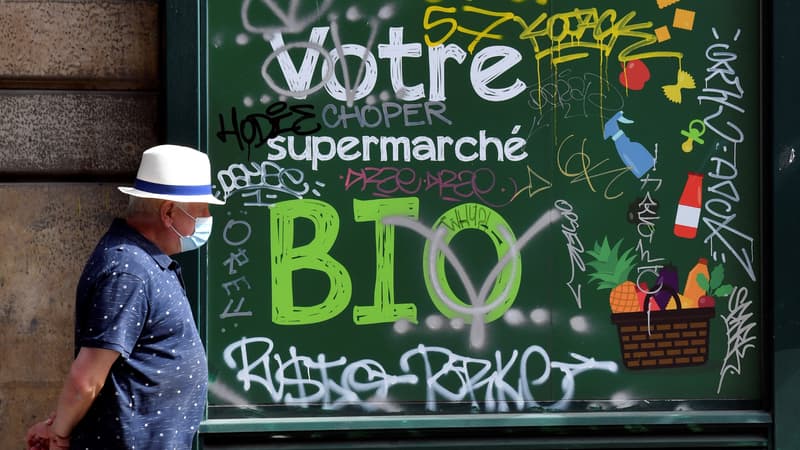Will organics recover from the inflationary crisis? For several months, the so-called alternative consumption and in particular that of products from organic farming have been the most affected by consumer arbitration.
Between January and September 2022, purchases of organic products plummeted 6.3% in France according to the National Federation of Organic Agriculture (Fnab). A particularly marked phenomenon among organic purists (Biocoop, La Vie claire) with a 16% decline according to NielsenIS, while classic supermarkets hold up slightly better (-5.3%).
After years of double-digit growth in which the weight of the organic has gone from 2.1% of consumption in 2014 to 5.1% in 2020 in the last two years, the curve has been reversed. This year, the weight of organics has fallen below 5%. In two years, more than a billion euros have been flown, according to the Iri Institute.
The declining organic market
Turnover of organic products in France
€13.2 billion in 2020
€12.8 billion in 2021
€12.1 billion in 2022
(Source: Iris)
The main factor behind this drop is obviously inflation. An organic product is still on average 30% more expensive than its conventional equivalent.
Mass distribution reduces the place of organic
An organic crisis that is harming the entire sector. To the point that he is now asking mass distribution for help after having criticized it for years. In an open letter, the three main organizations in the sector (Synabio, FOREBio and FNAB) ask supermarkets not to withdraw from organic.
which is the case. To accommodate more accessible products, supermarkets logically go after the less attractive organic shelves. By September 2022, supply had fallen 7.3% in eight months, according to Iri. A decrease greater than the drop in billing, point out the federations.
“An Indecent Offer”
Will the supermarkets be the gravediggers of the ecological or are they the easy scapegoat of a crisis that is weakening an entire sector?
Some distribution groups want to be reassuring.
“Let’s turn our backs, tomorrows will sing.” It is essentially the discourse of the pro-bios today.
The reality is perhaps less idyllic. In any case, this is what some observers in the world of consumption think.
As Xavier Terlet, president of ProtéinesXTC who judges in a column published on the site of LSAs that the price of organic was already a brake before the current crisis.
The increase in the organic offer in recent years in supermarkets has thus been higher than the evolution of turnover on the shelves. Already proof of an underlying fragility.
Leclerc’s organic failure
Soon the end of the Organic Markets, Leclerc’s organic brand? Launched in 2018 to great fanfare in accessible organic positioning (30% lower price), Organic Markets was targeting 40 stores in 2019 and 200 in 2022. Four years later, the group has painfully counted 17 and the concept must be abandoned. An ill-fated project according to the specialist Frank Rosenthal: “What interest does a Leclerc partner have in putting an Organic Market in his shopping center when he already has a stocked organic department?” he wonders. The democratization of organic is done by supermarkets, not specialized stores.”
Organic product or good product?
If the price factor is obviously central to the current disaffection, it may not be the only one. It is the price/benefit ratio that leads consumers to believe that a product is too expensive and to arbitrate against it. And this is the heart of the problem with organic.
Paying more (even much more) for a product that does not provide more pleasure than a conventional product is more difficult in times of restricted purchasing power.
Especially since the commercial dimension is often neglected, especially by organic brands. Limited offer, staging of products reduced to a minimum, non-existent information and education… Biocoops, La Vie Claire and other Naturalia struggle to attract customers beyond a circle of consumers already convinced by organic products.
The Grand Frais Counterexample
The best counterexample is that of Grand Frais. Favorite French food brand for several years, this specialist in fresh (largely conventional) products does not have a very attractive price positioning. Often more expensive than the nearest supermarket, little active in promotion, a fairly premium offer… A priori, Grand Frais was the ideal candidate to suffer in times of inflation.
But it is not so, on the contrary. In 2022, Grand Frais will exceed 4.1% of the traditional fresh market share (vs. 3.7% in 2020) according to Kantar and its penetration rate is reaching a record level (19.3% in 2022 vs. to 16.9% in 2020) .
Make organic desirable. This is perhaps the example of Grand Frais that we will have to follow once the inflationary crisis is over.
Source: BFM TV


